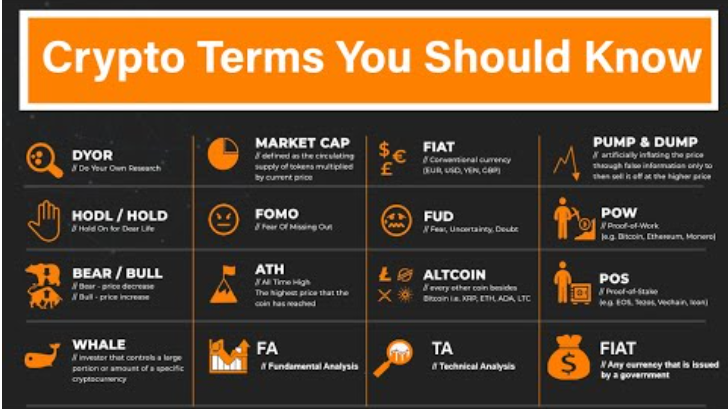Common Crypto Terms You Need to Know (Glossary Post)
Stepping into the world of cryptocurrency can feel like learning a new language. Terms like blockchain, HODL, DeFi, and gas fees pop up everywhere and if you’re not familiar, it’s easy to get lost.
This crypto glossary for beginners breaks down the most commonly used terms in simple language. Whether you’re buying your first coin or exploring the broader crypto ecosystem, this post will help you talk the talk with confidence.
Essential Crypto Terms (Alphabetically)
Blockchain
A decentralized, digital ledger that records all cryptocurrency transactions across a network. It’s the foundational technology behind most cryptocurrencies.
🛠️ Altcoin
Any cryptocurrency that isn’t Bitcoin. Examples include Ethereum (ETH), Solana (SOL), Cardano (ADA), and thousands more.
🪙 Bitcoin (BTC)
The first and most well-known cryptocurrency, launched in 2009 by an anonymous creator known as Satoshi Nakamoto.
🔐 Wallet
A tool used to store your private keys and manage your cryptocurrency. Can be hot (connected to the internet) or cold (offline and more secure).
🧾 Private Key
A secure, secret password that gives you access to your cryptocurrency. Whoever holds the private key controls the crypto — so keep it safe and never share it.
🏦 Exchange
A platform where you can buy, sell, and trade cryptocurrencies. Examples: Binance, Coinbase, Kraken.
🧠 DYOR (Do Your Own Research)
A common phrase in crypto encouraging people to research before investing instead of blindly following hype or tips.
📈 Bull Market
A period when crypto prices are rising or expected to rise. It’s associated with optimism and buying activity.
📉 Bear Market
A period when crypto prices are falling or expected to fall. It’s associated with pessimism and selling activity.
💎 HODL
Originally a typo for “hold,” it now stands for “Hold On for Dear Life.” Refers to keeping your crypto through market ups and downs.
🔥 FOMO (Fear of Missing Out)
The feeling you get when prices are rising quickly and you’re tempted to buy in late — often leads to impulsive decisions.
😱 FUD (Fear, Uncertainty, Doubt)
Negative information or rumors that can cause panic selling. Sometimes spread intentionally to manipulate the market.
⚙️ Gas Fees
The transaction fees paid on networks like Ethereum to process transactions or run smart contracts.
🧾 Smart Contract
Self-executing code stored on the blockchain that automatically performs actions when certain conditions are met. Used in DeFi, NFTs, and more.
🌐 DeFi (Decentralized Finance)
A movement that uses blockchain and smart contracts to offer financial services (lending, trading, etc.) without traditional banks.
🎨 NFT (Non-Fungible Token)
A unique digital asset representing ownership of content like art, music, or virtual items. Unlike cryptocurrencies, NFTs are not interchangeable.
⚖️ Stablecoin
A cryptocurrency that is pegged to a stable asset like the US Dollar (e.g., USDT, USDC). Designed to reduce volatility.
🔄 Swap
Trading one cryptocurrency for another. Many DeFi apps and exchanges offer “swap” features for instant token exchanges.
🪙 Token
A type of cryptocurrency built on an existing blockchain (e.g., Uniswap is a token on the Ethereum network).
⚡ Layer 1 / Layer 2
-
Layer 1: The base blockchain (e.g., Bitcoin, Ethereum).
-
Layer 2: Built on top of Layer 1 to improve speed and reduce fees (e.g., Lightning Network, Arbitrum).
🧱 Mining
The process of validating transactions and adding them to the blockchain. In proof-of-work systems like Bitcoin, miners earn rewards in crypto.
Staking: Common Crypto Terms You Need to Know (Glossary Post)
Locking up crypto in a wallet to support network security and earn rewards. Common in proof-of-stake systems like Ethereum 2.0.
Portfolio
Your collection of crypto assets. Like a stock portfolio, it’s good to diversify based on risk and goals.
Final Thoughts on Common Crypto Terms You Need to Know (Glossary Post)
Understanding crypto terms is the first step toward becoming a confident investor or user. This glossary is your go-to cheat sheet — so bookmark it and refer back anytime something sounds unfamiliar.
Remember: in the fast-moving world of crypto, knowledge is your best investment.


